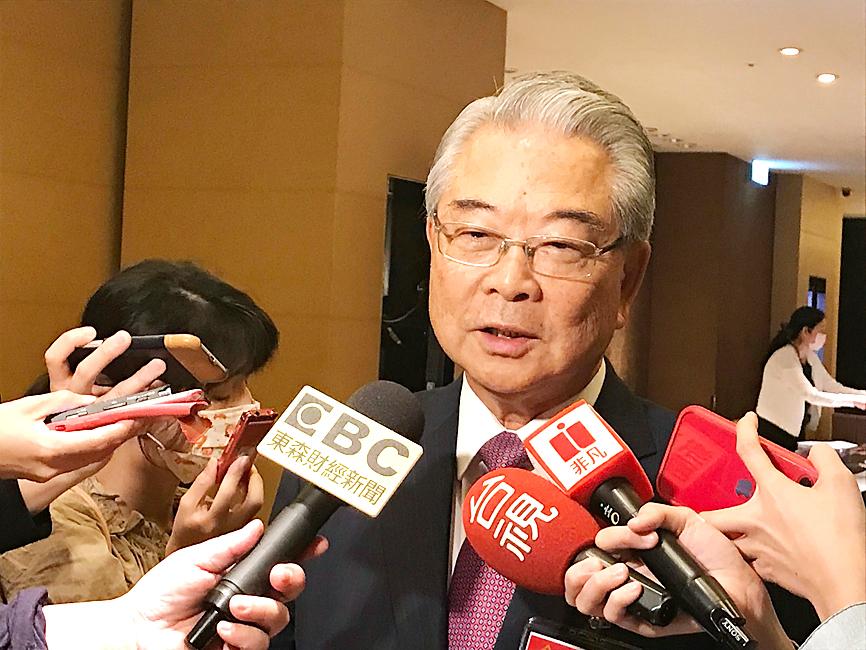Business tycoons yesterday said that component shortages might persist through next year due mainly to lingering demand-supply imbalances and chaos in the shipping industry.
“It will take a while to resolve ongoing component shortages that have slowed product delivery,” said Rock Hsu (許勝雄), chairman of the Third Wednesday Club (三三會), whose membership is limited to the top 100 firms in each business sector.
Companies would have to exercise caution in dealing with the issue, as it might extend into next year, Hsu said.

Photo: Lee Ya-wen, Taipei Times
Surging demand for semiconductors used in the 5G, Internet of Things, electric vehicle and artificial intelligence sectors is causing component shortages, while the COVID-19 pandemic is driving companies and education facilities to adopt digital transformation, he said.
However, suppliers are unable to expand their facilities to meet the increase in business, and are limited by the pandemic, said Hsu, who is also chairman of Compal Electronics Inc (仁寶電腦), the world’s No. 2 contract laptop maker.
On Tuesday, Quanta Computer Inc (廣達電腦) chairman Barry Lam (林百里) said that demand for laptops is healthy, but component shortages are so serious that he fails to see when the bottleneck would come to an end.
Acer Inc chairman and chief executive officer Jason Chen (陳俊聖) and Hon Hai Precision Industry Co (鴻海精密) chairman Young Liu (劉揚偉) have also made similar remarks.
Overbooking by clients to ensure supply security amid the pandemic might have worsened the situation, and local firms have taken precautionary measures to mitigate potential issues, Hsu said.
Lin Por-fong (林伯豐), chairman of Chinese National Association of Industry and Commerce (工商協進會) and a member of the Third Wednesday Club, said that inventory adjustments would be inevitable if clients practice overbooking, adding that container shortages and shipping delays are making things worse.
Speaking at a digital economy forum in Taipei yesterday, Pegatron Corp (和碩) chairman Tung Tzu-hsien (童子賢) described the component shortage crisis as “a sweet, but difficult burden.”
“The shortages speak to a robust demand,” Tung said.
However, Liu said at an awards ceremony on Tuesday that such shortages do not necessarily mean an increase in demand only, but could also reflect a sense of uncertainty in global supply chains.
Much as consumers hoarded toilet paper at the beginning of the COVID-19 outbreak, tech companies are hoarding components and materials, he said.
“The US-China trade dispute, the Huawei Technologies Inc (華為) ban, the COVID-19 pandemic and the emergence of 5G ... all added to uncertainty,” Liu said. “We are now seeing industries that were not used to do advance ordering — such as the automotive industry — stocking up much more.”
Liu said that component shortages could affect about 10 percent of Hon Hai’s orders, but he added that rush orders could disproportionally affect the company’s business.
“When we get lots of rush orders and overbooking, it does cause a more serious effect. It is hard to tell how long the delays will be,” he said.

The New Taiwan dollar is on the verge of overtaking the yuan as Asia’s best carry-trade target given its lower risk of interest-rate and currency volatility. A strategy of borrowing the New Taiwan dollar to invest in higher-yielding alternatives has generated the second-highest return over the past month among Asian currencies behind the yuan, based on the Sharpe ratio that measures risk-adjusted relative returns. The New Taiwan dollar may soon replace its Chinese peer as the region’s favored carry trade tool, analysts say, citing Beijing’s efforts to support the yuan that can create wild swings in borrowing costs. In contrast,

Nvidia Corp’s demand for advanced packaging from Taiwan Semiconductor Manufacturing Co (TSMC, 台積電) remains strong though the kind of technology it needs is changing, Nvidia CEO Jensen Huang (黃仁勳) said yesterday, after he was asked whether the company was cutting orders. Nvidia’s most advanced artificial intelligence (AI) chip, Blackwell, consists of multiple chips glued together using a complex chip-on-wafer-on-substrate (CoWoS) advanced packaging technology offered by TSMC, Nvidia’s main contract chipmaker. “As we move into Blackwell, we will use largely CoWoS-L. Of course, we’re still manufacturing Hopper, and Hopper will use CowoS-S. We will also transition the CoWoS-S capacity to CoWos-L,” Huang said

Nvidia Corp CEO Jensen Huang (黃仁勳) is expected to miss the inauguration of US president-elect Donald Trump on Monday, bucking a trend among high-profile US technology leaders. Huang is visiting East Asia this week, as he typically does around the time of the Lunar New Year, a person familiar with the situation said. He has never previously attended a US presidential inauguration, said the person, who asked not to be identified, because the plans have not been announced. That makes Nvidia an exception among the most valuable technology companies, most of which are sending cofounders or CEOs to the event. That includes

INDUSTRY LEADER: TSMC aims to continue outperforming the industry’s growth and makes 2025 another strong growth year, chairman and CEO C.C. Wei says Taiwan Semiconductor Manufacturing Co (TSMC, 台積電), a major chip supplier to Nvidia Corp and Apple Inc, yesterday said it aims to grow revenue by about 25 percent this year, driven by robust demand for artificial intelligence (AI) chips. That means TSMC would continue to outpace the foundry industry’s 10 percent annual growth this year based on the chipmaker’s estimate. The chipmaker expects revenue from AI-related chips to double this year, extending a three-fold increase last year. The growth would quicken over the next five years at a compound annual growth rate of 45 percent, fueled by strong demand for the high-performance computing